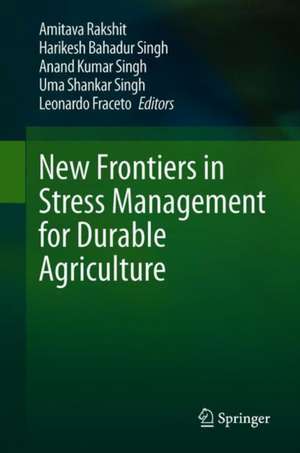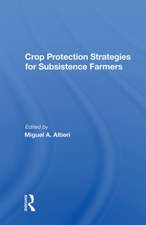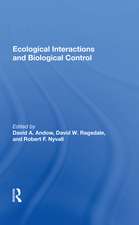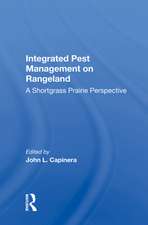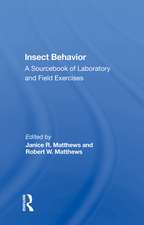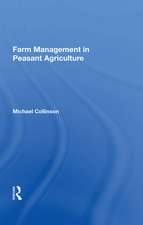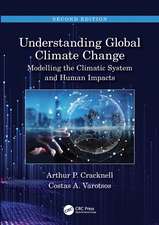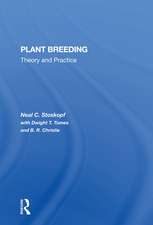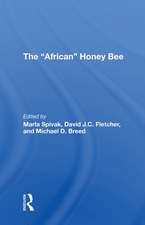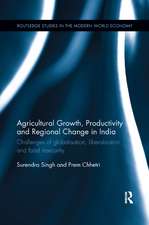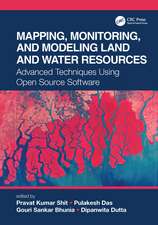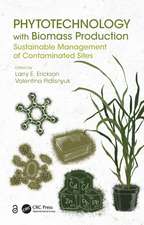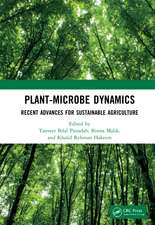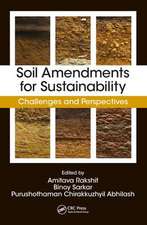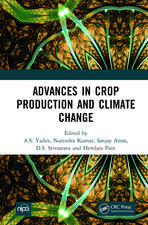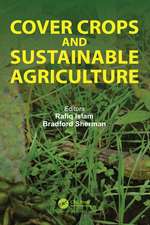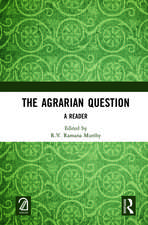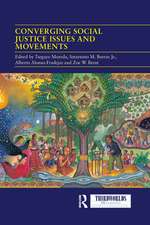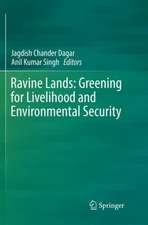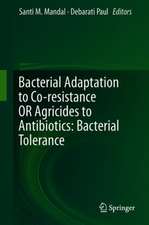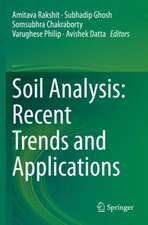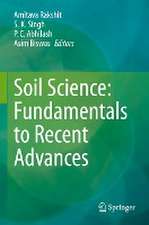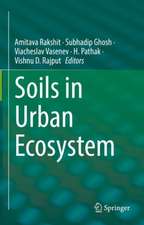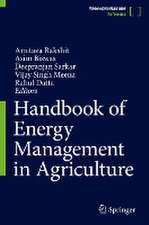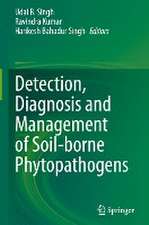New Frontiers in Stress Management for Durable Agriculture
Editat de Amitava Rakshit, Harikesh Bahadur Singh, Anand Kumar Singh, Uma Shankar Singh, Leonardo Fracetoen Limba Engleză Hardback – 24 mar 2020
Better understanding stress not only changes our perspective on the current environment, but can also bring a wealth of benefits, like improving sustainable agriculture and human beings’ living standards. Innovative systems are called for that protect and enhance the natural resource base, while increasing productivity via ‘holistic’ approaches, such as agroecology, agro-forestry, climate-smart agriculture and conservation agriculture, which also incorporate indigenous and traditional knowledge. The book ‘New Frontiers in Stress Management for Durable Agriculture’ details the current state of knowledge and highlights scientific advances concerning novel aspects of plant biology research on stress, biotic and abiotic stress responses, as well as emergent amelioration and reclamation technologies to restore normal functioning in agroecology.
| Toate formatele și edițiile | Preț | Express |
|---|---|---|
| Paperback (1) | 1066.17 lei 39-44 zile | |
| Springer Nature Singapore – 24 mar 2021 | 1066.17 lei 39-44 zile | |
| Hardback (1) | 1076.12 lei 39-44 zile | |
| Springer Nature Singapore – 24 mar 2020 | 1076.12 lei 39-44 zile |
Preț: 1076.12 lei
Preț vechi: 1415.96 lei
-24% Nou
Puncte Express: 1614
Preț estimativ în valută:
206.01€ • 214.95$ • 172.69£
206.01€ • 214.95$ • 172.69£
Carte tipărită la comandă
Livrare economică 10-15 martie
Preluare comenzi: 021 569.72.76
Specificații
ISBN-13: 9789811513213
ISBN-10: 981151321X
Pagini: 660
Ilustrații: XXIV, 660 p. 72 illus., 53 illus. in color.
Dimensiuni: 155 x 235 mm
Greutate: 1.09 kg
Ediția:1st ed. 2020
Editura: Springer Nature Singapore
Colecția Springer
Locul publicării:Singapore, Singapore
ISBN-10: 981151321X
Pagini: 660
Ilustrații: XXIV, 660 p. 72 illus., 53 illus. in color.
Dimensiuni: 155 x 235 mm
Greutate: 1.09 kg
Ediția:1st ed. 2020
Editura: Springer Nature Singapore
Colecția Springer
Locul publicării:Singapore, Singapore
Cuprins
Part 1. Abiotic stress response in plants and approaches towards mitigation.- Chapter 1. Physiological responses and resilience of plants to climate change.- Chapter 2. Allelopathy: Implications in Natural and Managed Ecosystems.- Chapter 3. Effect of Drought Stress on Crop Production.- Chapter 4. Impact of salinity stress in crop plants and mitigation strategies.- Chapter 5. Sustainable production of Rice under sodicity stress condition.- Chapter 6. Chilling stress during postharvest storage of fruits and vegetables.- Chapter 7. Chemical stress on plants.- Chapter 8. Role of ionizing radiation-induced mutations in the development of rice cultivars.- Chapter 9. Adverse Effect of Heavy Metal Toxicity in Plants Metabolic Systems and Biotechnological Approaches for Its Tolerance Mechanism.- Chapter 10. Crop growth under heavy metals stress and its mitigation.- Chapter 11. Conservation of Tropical Agriculture in the era of Changing Climate.- Chapter 12. Alleviation of abiotic stress by Non-conventional plant growth regulators in plant physiology.- Chapter 13. Use of different agronomic practices to minimize ozone injury in plants: A step towards Sustainable Agriculture.- Chapter 14. Micro-nutrient seed priming: A pragmatic approach towards abiotic stress management. Chapter 15. Bioactive Compost: An approach for managing plant growth in environmentally stressed soils.- Chapter 16. Seed priming: Implicationin Agriculture to Manage Salinity Stress in Crops.- Chapter 17. Application of nano-particles in agriculture as fertilizers and pesticides: challenges and opportunities.- Chapter 18. Phenomics assisted breeding: An emerging way for stress management.- Chapter 19. Prediction of Climate Change using Statistical Downscaling Techniques.- Part 2. Improving crops resistance to biotic stress.- Chapter 20. Microbial Bio-agents in Agriculture: Current status and Prospects.- Chapter 21. Application of plant-volatile mediated signalingin sustainable agriculture.- Chapter 22. Biological host response: a paradigm and strategy to overcome biotic stress caused by powdery mildew causalagents in plants.- Chapter 23. CRISPR/Cas9-edited rice: a new frontier for sustainable agriculture.- Part 3. Research highlights in different crops.- Chapter 24. Agronomic Interventions for Drought Management in Crops.- Chapter 25. Flower crops response to biotic and abiotic stresses.- Chapter 26. Begomovirus menance and its management in vegetable crops.- Chapter 27. Management of abiotic stresses in vegetable crops.- Chapter 28. Realizing the potential of coastal flood-prone areas for rice production in West Bengal: prospects and challenges.- Chapter 29. Mechanisms of abiotic stress tolerance and their management strategies in fruit crops.- Chapter 30. Biotic Stress Management in Rice (Oryza sativa L.) through Conventional and Molecular Approaches.- Chapter 31. System of Assured Rice Production in kharif: A resource-conserving and climate-resilient methodology for higher productivity and profitability.
Notă biografică
Amitava Rakshit, an IIT, Kharagpur alumnus is presently the faculty member in the Department of Soil Science and Agricultural Chemistry at Institute of Agricultural Sciences, Banaras Hindu University(IAS, BHU). Dr.Rakshit worked in the Department of Agriculture, Government of West Bengal in administration and extension roles. He has visited Scandinavia, Europe and Africa pertaining to his research work and presentation. He was awarded with TWAS Nxt Fellow (Italy),BiovisionNxt Fellow (France), Darwin Now Bursary(British Council),Young achiever award and Best Teacher’s Award at UG and PG level . He is serving as review college member of British Ecological Society, London since 2011, member of Global Forum on Food Security and Nutrition of FAO, Rome and Commission on Ecosystem Management of IUCN. He has published 70 research papers, 35 book chapters, 28 popular articles, one manual and co-authored twenty books.
Harikesh Bahadur Singhis presently a retired Professor of Mycology and Plant Pathology from IAS, BHU. Over the past 35 years, Professor Singh has served at Central Universities and CSIR Institutes with his teaching and research. Based on his scientific contribution and leadership in the field of plant pathology, Professor Singh has been honoured with prestigious awards, such as the CSIR technology award, M.S. Swaminathan award, Mundkur Memorial award, and BRSI Industrial Medal. His research has resulted in more than 300 publications and 17 books.
Anand Kumar Singh is presently the deputy director general of horticulture, Indian Council of Agricultural Research, has a bachelor's degree in Agriculture from Banars Hindu University, a master's and PhD in Horticulture with a specialization in Pomology from Indian Agricultural Research Institute, New Delhi. His research area include genetic improvement of fruit crops, plant Tissue cultureand transcriptome analysis of mango. He was honored with several prestigious awards, notable being, Mombusho Award (1989) by Japanese Govt. ,visiting scientist award by Association of International Education, Japan (1999); DBT Overseas Associateship Award (2006); Gold Medal: The Horticultural Society of India (2008); Fellow of National Academy of Agricultural Sciences(2016) and many more.
Uma Shankar Singh did his graduation from Delhi University; Master and PhD in Plant Pathology from G.B. Pant University of Agriculture & Technology (GBPUAT), Pantnagar, India. Presently Dr. Singh is South Asia Regional Coordinator & India Country Manager at International Potato Center. He was Director of IRRI South Asia Regional Center (ISARC) & Principal Scientist at International Rice Research Institute (IRRI). Dr. Singh is the main architect of three historical regional seed agreements on varietal and seed sharing among 6 countries from South & South East Asia. Theseinnovative interventions helped to achieve an unprecedented speed of diffusion of STRVs benefiting millions of poor farmers in South Asia.Dr. Singh has authored/co-authored 188 scientific papers, 51 book chapters, ten books in 17 volumes and 9 technical bulletins.
Leonardo Fernandes Fraceto has a bachelor's degree in Chemistry from the State University of Campinas (1997), a master's in Functional and Molecular Biology from the State University of Campinas (2000) and a PhD in Functional and Molecular Biology from the State University of Campinas (2003). He is currently an Associate Professor at the Institute of Science and Technology of São Paulo State University (UNESP), Campus Sorocaba at the Environmental Engineering undergraduate course and at the postgraduate in Environmental Sciences. He coordinated the Postgraduate Program in Environmental Sciences of Unesp/Sorocaba (from 2012 to 2016). He has experience in chemistry and biochemistry, with an emphasis on environmental nanotechnology and applications of nanotechnology in agriculture.
Harikesh Bahadur Singhis presently a retired Professor of Mycology and Plant Pathology from IAS, BHU. Over the past 35 years, Professor Singh has served at Central Universities and CSIR Institutes with his teaching and research. Based on his scientific contribution and leadership in the field of plant pathology, Professor Singh has been honoured with prestigious awards, such as the CSIR technology award, M.S. Swaminathan award, Mundkur Memorial award, and BRSI Industrial Medal. His research has resulted in more than 300 publications and 17 books.
Anand Kumar Singh is presently the deputy director general of horticulture, Indian Council of Agricultural Research, has a bachelor's degree in Agriculture from Banars Hindu University, a master's and PhD in Horticulture with a specialization in Pomology from Indian Agricultural Research Institute, New Delhi. His research area include genetic improvement of fruit crops, plant Tissue cultureand transcriptome analysis of mango. He was honored with several prestigious awards, notable being, Mombusho Award (1989) by Japanese Govt. ,visiting scientist award by Association of International Education, Japan (1999); DBT Overseas Associateship Award (2006); Gold Medal: The Horticultural Society of India (2008); Fellow of National Academy of Agricultural Sciences(2016) and many more.
Uma Shankar Singh did his graduation from Delhi University; Master and PhD in Plant Pathology from G.B. Pant University of Agriculture & Technology (GBPUAT), Pantnagar, India. Presently Dr. Singh is South Asia Regional Coordinator & India Country Manager at International Potato Center. He was Director of IRRI South Asia Regional Center (ISARC) & Principal Scientist at International Rice Research Institute (IRRI). Dr. Singh is the main architect of three historical regional seed agreements on varietal and seed sharing among 6 countries from South & South East Asia. Theseinnovative interventions helped to achieve an unprecedented speed of diffusion of STRVs benefiting millions of poor farmers in South Asia.Dr. Singh has authored/co-authored 188 scientific papers, 51 book chapters, ten books in 17 volumes and 9 technical bulletins.
Leonardo Fernandes Fraceto has a bachelor's degree in Chemistry from the State University of Campinas (1997), a master's in Functional and Molecular Biology from the State University of Campinas (2000) and a PhD in Functional and Molecular Biology from the State University of Campinas (2003). He is currently an Associate Professor at the Institute of Science and Technology of São Paulo State University (UNESP), Campus Sorocaba at the Environmental Engineering undergraduate course and at the postgraduate in Environmental Sciences. He coordinated the Postgraduate Program in Environmental Sciences of Unesp/Sorocaba (from 2012 to 2016). He has experience in chemistry and biochemistry, with an emphasis on environmental nanotechnology and applications of nanotechnology in agriculture.
Textul de pe ultima copertă
Using accessible farming practices to meet the growing demands on agriculture is likely to result in more intense competition for natural resources, increased greenhouse gas emissions, and further deforestation and land degradation, which will in turn produce additional stress in the soil-water-plant-animal continuum. Stress refers to any unfavorable force or condition that inhibits customary functioning in plants. Concurrent manifestations of different stresses (biotic and abiotic) are very frequent in the environment of plants, which consequently reduces yield.
Better understanding stress not only changes our perspective on the current environment, but can also bring a wealth of benefits, like improving sustainable agriculture and human beings’ living standards. Innovative systems are called for that protect and enhance the natural resource base, while increasing productivity via ‘holistic’ approaches, such as agroecology, agro-forestry, climate-smart agriculture and conservation agriculture, which also incorporate indigenous and traditional knowledge. The book ‘New Frontiers in Stress Management for Durable Agriculture’ details the current state of knowledge and highlights scientific advances concerning novel aspects of plant biology research on stress, biotic and abiotic stress responses, as well as emergent amelioration and reclamation technologies to restore normal functioning in agroecology.
Better understanding stress not only changes our perspective on the current environment, but can also bring a wealth of benefits, like improving sustainable agriculture and human beings’ living standards. Innovative systems are called for that protect and enhance the natural resource base, while increasing productivity via ‘holistic’ approaches, such as agroecology, agro-forestry, climate-smart agriculture and conservation agriculture, which also incorporate indigenous and traditional knowledge. The book ‘New Frontiers in Stress Management for Durable Agriculture’ details the current state of knowledge and highlights scientific advances concerning novel aspects of plant biology research on stress, biotic and abiotic stress responses, as well as emergent amelioration and reclamation technologies to restore normal functioning in agroecology.
Caracteristici
Provides an integrated view of the challenges and opportunities that agriculture will face in the future as a result of different stresses Discusses how the stress resulting from different components can be overcome by assessing, measuring and predicting environmental changes and stress, identifying opportunities and adapting to change and responding to multifactorial change Includes all aspects of this interdisciplinary technology, where knowledge, methods and expertise are required from plant science, microbiology, physical science, soil science, agronomy, biochemical engineering and molecular biology
